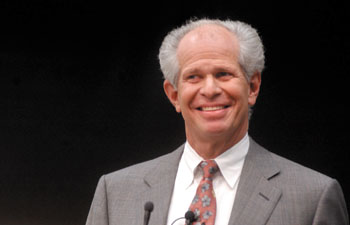
Dr. Frank Boehm, professor of Obstetrics and Gynecology and director of Maternal Fetal Medicine, was this year's speaker for the eighth annual Phillip W. Felts Lecture Series in the Humanities held last week at Vanderbilt University Medical Center. Boehm spoke on "Crying in Medicine." The lecture focused on building trust and personal relationships between doctors and patients. (photo by Dana Johnson
Speakers visit during World Health Week
A Medecins Sans Frontieres/Doctor’s Without Borders traveling interactive exhibit, The Crisis of Neglected Diseases, will be part of next week’s annual World Health Week 2002.
The 14th annual World Health Week, a weeklong series of speakers and events, sponsored by the International Medical Educational Experiences Committee of Vanderbilt University Schools of Medicine and Nursing, begins March 25 and ends March 29.
Nicolas de Torrente, Ph.D., director of Doctors Without Borders USA, will also be one of the three featured keynote speakers during the week. Torrente will speak on Wednesday, March 27. His topic will be “Access to Essential Medicines: Defining the Crisis and Facing Challenges.”
Prior to joining the U.S. office of Doctors Without Borders in 2001, he worked extensively for the organization, first as an administrator and head of mission in Tanzania and Rwanda, and later as an emergency coordinator in Somalia, Liberia, the Democratic Republic of Congo, Macedonia, and Afghanistan. Torrente recently returned from a monthlong field mission in Afghanistan.
The Access to Essential Medicines EXPO, housed in and around a 48-foot-long trailer, will be located between Light Hall and the Veteran’s Affairs Medical Center from Wednesday, March 27 to Friday, March 29. The hours are 9 a.m. to 7 p.m. The exhibit, staffed by MSF physicians, nurses and other field staff who can answer questions and speak from first-hand experience, focuses on the lack of research and development into five infectious diseases that have affected patients around the world—sleeping sickness, tuberculosis, malaria, HIV/AIDS and kala-azar. The trailer will be surrounded by 20 flytraps, the kind of traps used to catch the tse-tse fly, which carries trypanomiasis (sleeping sickness). Inside each flytrap, there are messages and facts about the crisis, such as “17 million people die of treatable infectious diseases every year.”
Monday’s speakers, addressing “Beyond U.S. Borders: Providing Care to Global Populations,” are Dr. Jill Jones, assistant professor of Medicine at VUMC, Carol Etherington, R.N., M.S.N, assistant professor of Nursing at VUSN, and Dr. Deborah Sherman, a local ophthalmologist.
Tuesday’s speaker is Dr. P. Roy Vagelos, former chairman and CEO of Merck & Co., Inc. His topic is “Blending Research, Business and Ethics: Merck as a Case Study.”
Vagelos served as chief executive officer of Merck & Co. Inc. for nine years, from 1985 to 1994. He is a member of the National Academy of Sciences, the American Academy of Arts and Sciences and the American Philosophical Society.
Friday’s speaker will be Dr. Gerald T. Keusch, director of Fogarty International Center, National Institutes of Health. His topic is “Disparities in Global Health: Narrowing the Gap.”
Keusch has been involved in clinical medicine, teaching and research, most recently as Professor of Medicine at Tufts University School of Medicine and Senior Attending Physician and Chief of the Division of Geographic Medicine and Infectious Diseases at the New England Medical Center in Boston.
All lectures will be held at noon in 208 Light Hall.
World Health Week student coordinators Andrew White, Bianca Camac and Dana Deaton, all second-year students, said the week’s speakers were selected because of their high profiles in the field of global health care.
“But we also wanted speakers who interact well with students, those who can answer questions about what it’s like to work in the field of international health care,” Camac said.
The World Health Week lecture series, which began in 1988, is intended to provide exposure to international health issues to students, faculty and the general public. It is also designed to demonstrate to students the opportunities for using a medical degree in an international setting.













